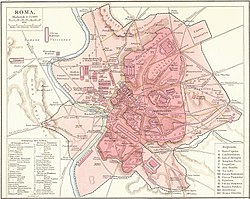Forum of Caesar

The Forum of Caesar and the Temple of Venus Genetrix
|
|
| Location | IV Templum Pacis |
|---|---|
| Built in | 46 BC |
| Built by/for | Gaius Julius Caesar |
| Type of structure | Imperial fora |
| Related | Theatre of Pompey, Augustus Caesar |
Coordinates: 41°53′38.43″N 12°29′5.77″E / 41.8940083°N 12.4849361°E
The Forum of Caesar (Italian: Foro di Cesare), also known as Forum Iulium or Forum Julium, Forum Caesaris, is a forum (or plaza) built by Julius Caesar near the Forum Romanum in Rome in 46 BC.
Caesar decided to construct a forum bearing his name in the northeast section of the Forum Romanum, of which he purchased a very expensive, select amount of parcels of land in that area. Forum construction began in 54 BC, and it was dedicated to Caesar and his deeds in 46 BC upon completion. Some scholars, however, believe that Augustus furnished the west side with the shops and offices that were considered part of the Forum of Caesar, therefore being the one to see its completion. The Forum spanned from the Argiletum on the southeast side of the Forum Romanum to the Atrium Libertatis and spanned 160 meters by 75 meters. As part of the dedication, lavish games were offered and funded by Caesar, indicating the staggering cost and thus the personal interest that Caesar had invested in the project.
The Forum of Caesar originally meant an expansion of the Forum Romanum. The Forum, however, evolved so that it served two additional purposes. As Caesar became more and more involved in this project, the Forum became a place for public business that was related to the Senate in addition to a shrine for Caesar himself as well as Venus Genetrix.
Before his assassination, Caesar would have the Senate meet him before his temple, an act deemed very unpopular by the Senate. The Forum of Caesar also had an effect on the Curia, which Caesar began to reconstruct in 44 BC. This reconstruction moved the Forum of Caesar much closer to the Curia. The ten tabernae located on the western side of the Forum and its now close approximation to the Senate house symbolized the unity that Caesar felt between himself and the Senate.
...
Wikipedia

